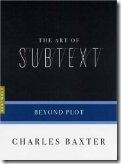Creating a Scene
Excerpt from The Art of Subtext: Beyond Plot by Charles Baxter:
 "The particular dark reflecting pool that literature presents to us quite possibly has no purpose at all, any more than great music does. The pointlessness of art is not an argument against it. It is simply a proposition that pragmatists worry over. Consequently, as a way to stave off pointlessness and the specter of a profitless activity, we—Americans particularly—tend to moralize and pragmatize the practice of literature. We sometimes try to avoid in our own writing and reading what me may find troubling in our lives. But what is good when encountered in life is often not good for literature, and the reverse: what's good for fiction is not always good when instrumentalized in life.
"The particular dark reflecting pool that literature presents to us quite possibly has no purpose at all, any more than great music does. The pointlessness of art is not an argument against it. It is simply a proposition that pragmatists worry over. Consequently, as a way to stave off pointlessness and the specter of a profitless activity, we—Americans particularly—tend to moralize and pragmatize the practice of literature. We sometimes try to avoid in our own writing and reading what me may find troubling in our lives. But what is good when encountered in life is often not good for literature, and the reverse: what's good for fiction is not always good when instrumentalized in life.
The distorting effect of wishes in the writing of fiction can hardly be overestimated. In fiction the force of a wish can result in the formal characteristics of fantasy writing. The story becomes the stage, not for truth, but self-actualization. We try to imagine the person as we would like ourselves to be and as a result write a banal and lifelessly idealistic story. Stories of this type commit a number of sins against literature, among them, first, the distortion of events in the service of a positive self-image, and, second, the habit of making people out to be better than they actually are.
In fiction we want to have characters create scenes that in real life we would typically avoid. Writers might want to have happy lives, but they fear the revenge of the genteel community if their writings are too lively. If they do, they give up their writerly badge of honor. Stories often require sparkplug characters--radically unpleasant types--as focusing agents. The refusal of a story to grant a wish, its refusal to be polite, genteel, or useful, offers manifold opportunities for the messy self-reproaches and grotesqueries characteristic of fiction."





